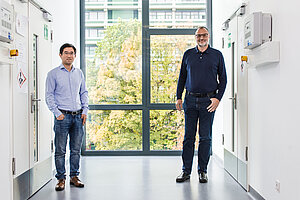The Max Planck Fellow program promotes collaboration between outstanding university professors and Max Planck Society researchers. The appointment of university professors as Max Planck Fellows is limited to a five-year period and also entails the supervision of a small working group at a Max Planck Institute.
The Max Planck Fellow Group Heterogeneous Redox Catalysis under the direction of Prof. Dr. Martin Muhler has now been extended for another 5 years.
Group member Dr. Baoxiang Peng has been working as group leader at the Chair of Technical Chemistry of the Ruhr-University Bochum since November 2015. He is working on the fundamental aspects of three-phase redox catalysis under mild conditions:
In the field of reduction, Dr. Peng's research focuses on the hydrogenation of nitrobenzene and the hydrodeoxygenation of biomass-derived platform molecules such as glycerol, phenol or 5-hydroxymethylfurfural. In the field of oxidation, he deals with the selective oxidation of alcohols and the challenging activation of the C-H bond in alkanes. The challenge here is to elucidate the reaction mechanisms and the interaction between the dissolved reactants and the catalyst surface at the atomic level.
Compared with applying stoichiometric amounts of conventional reducing or oxidizing agents, the use of hydrogen and oxygen can save considerable resources and avoid waste. By developing tailor-made heterogeneous catalysts, the Max Planck Fellow Group aims at increasing the efficiency of chemical redox processes.

